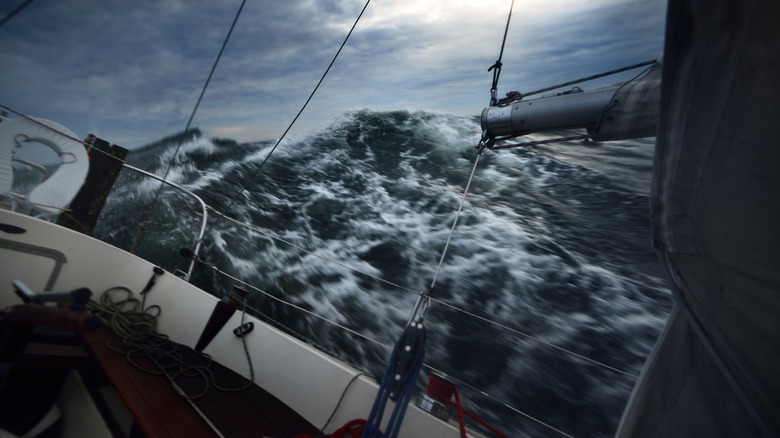Robert Redford's Top-Rated Sailing Movie Makes Real Sailors Want To Cry
The late Robert Redford, who died at the age of 89, left behind a treasure of masterful performances, perhaps none more challenging than this one. The 2013 film "All Is Lost," written and directed by J.C. Chandor, was a critical success. The movie drops viewers straight into the action from the very first scene as solo sailor Our Man (played by Redford) is jolted awake by a rush of water after a rogue shipping container smashes a hole into the hull of his 39-foot yacht.
In his late 70s during production, Redford performed his own stunts in a role that required almost no dialogue, carrying the entire film through pure physical performance and subtle expressions. The emotional arc of the mariner facing mortality as everything goes wrong — a collision, a ferocious storm, his boat sinking — brought a tear to the eye.
When the sailing community watched the film, however, it made them cry — as in cry out in anguish at the screen. These weren't salty tears from emotion; they were screams from sheer nautical frustration, mostly at the unrealistic depiction of the mariner and glaring technical inaccuracies. The reaction foreshadowed the hot-blooded pushback that another popular Robert Redford movie would get from real-life Appalachian Trail hikers a couple of years later.
Why sailors are ranting about the top-rated 'All Is Lost'
When sailing magazine Latitude 38 posted a "name that sailing movie" prompt on Facebook, roughly 94% of the comments absolutely panned the film, ranging from "worst sailing movie ever" to "an insult to sailors." The objections read like a nautical nightmare checklist: From the protagonist climbing his mast when a storm approaches to taking up precious time to shave, Our Man seems to make every wrong choice possible. The technical errors pile up fast as experienced sailors noticed the boom sheeting hanging slack when it's supposed to be stormy, or Our Man grabbing what's casually labeled a "life raft" that later becomes a spacious 12-person survival vessel where he teaches himself celestial navigation, or the impossibly solid fiberglass repair. Latitude 38 writes, "If the skipper's hull repair — which became an irrelevant detail — withstood a storm that the entire boat could not, then Our Man is the greatest fiberglasser in sailing history."
From the scathing notes from the seagoing community, this is clearly not a movie to watch if you want to learn how to sail. Writing for Vanity Fair, Mary Alice Miller summed up the disconnect best. After noting that the film was praised for its metaphors and symbolism, where "the hero suffers even though he does everything right," Miller (who also happens to have sailing credentials) wrote that "sailing experts saw things differently" and, after pointing out the main glaring faults (such as leaving the companionway open during a storm), noted that "Our Man would have fared better if he'd avoided some rudimentary errors."
All is not lost to critics and the wider audience
The harrowing survival tale earned a 95% rating from professionals and 64% from audience reviews on Rotten Tomatoes, proving that landlubbers found plenty to admire. Critics praised its existential meditation on isolation and mortality. At Cannes, one of Europe's main film festivals, the film was treated as high art and greeted with a standing ovation.
In its review, the London Evening Standard praised "All Is Lost" as "very pure film-making, set entirely on the water, without dialogue, just showing us the man's fight to survive from moment to moment." Meanwhile, A.O. Scott for The New York Times called it "an action movie in the most profound and exalted sense of the term." Redford's performance earned high praise from some, including Washington Post critic Ann Hornaday, who picked "All Is Lost" in an interview with Writer's Bone as the 2013 movie to watch. "It's just an amazing film, with an astonishing performance from Redford," said Hornaday. "I was heartbroken that he wasn't nominated for an Oscar for that one."
Even some sailors put the film in perspective. Latitude 38 cites Giorgi Muchaidze's Facebook comment inviting fellow seagoers not to take the movie so literally: "... Before you call this movie stupid: This is not a sailing movie. Think about it: It is about man's life. Any man's life... You wake up one morning to discover that your boat (job, family, relationship, health, etc.) is sinking. You do what you have to do, but more is coming. Nobody hears you (broken radio is a metaphor, guys)." So maybe the question is not if "All Is Lost" is a good sailing movie, but whether a film can be simultaneously terrible at depicting its subject and still succeed as art.


